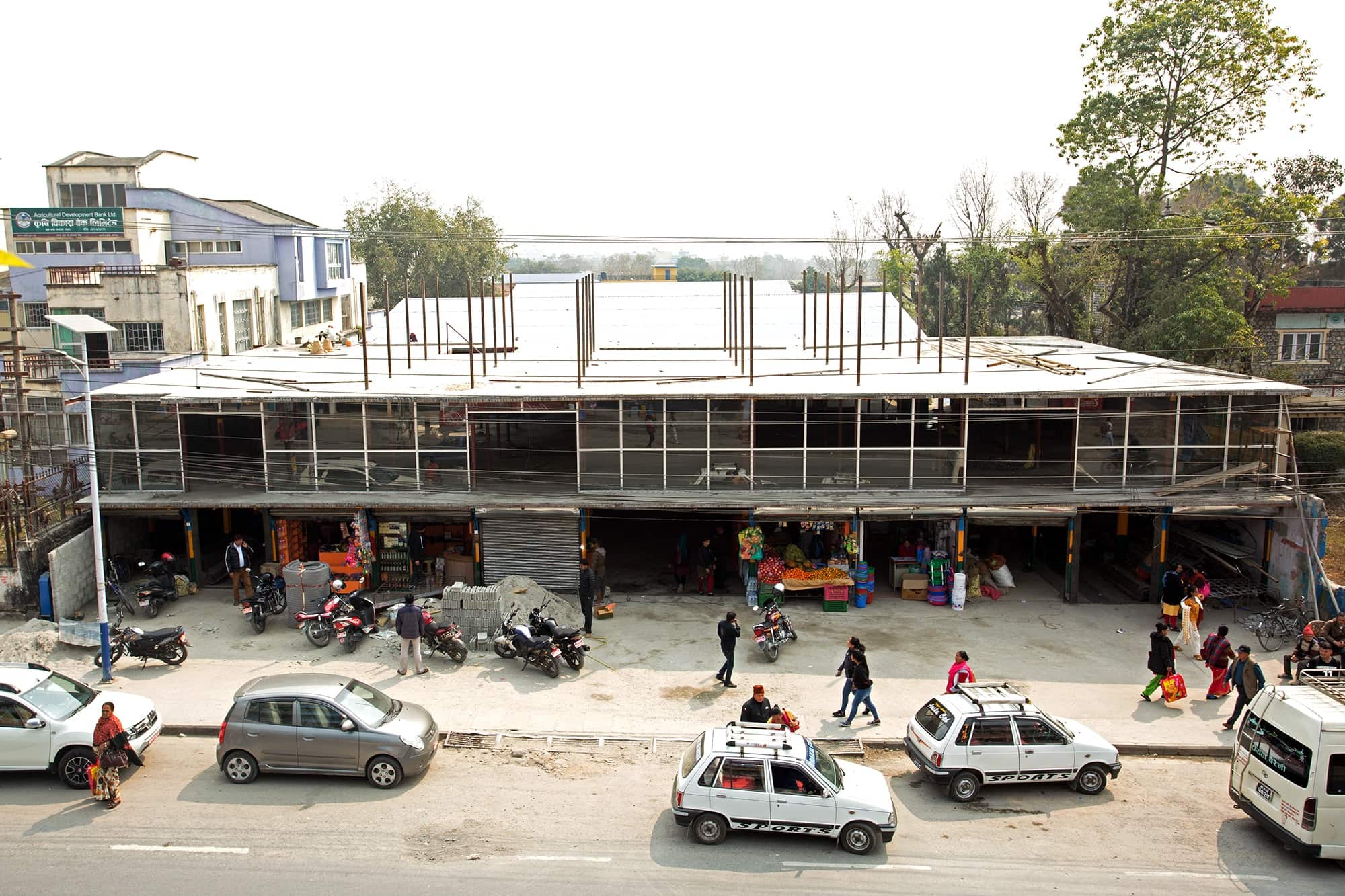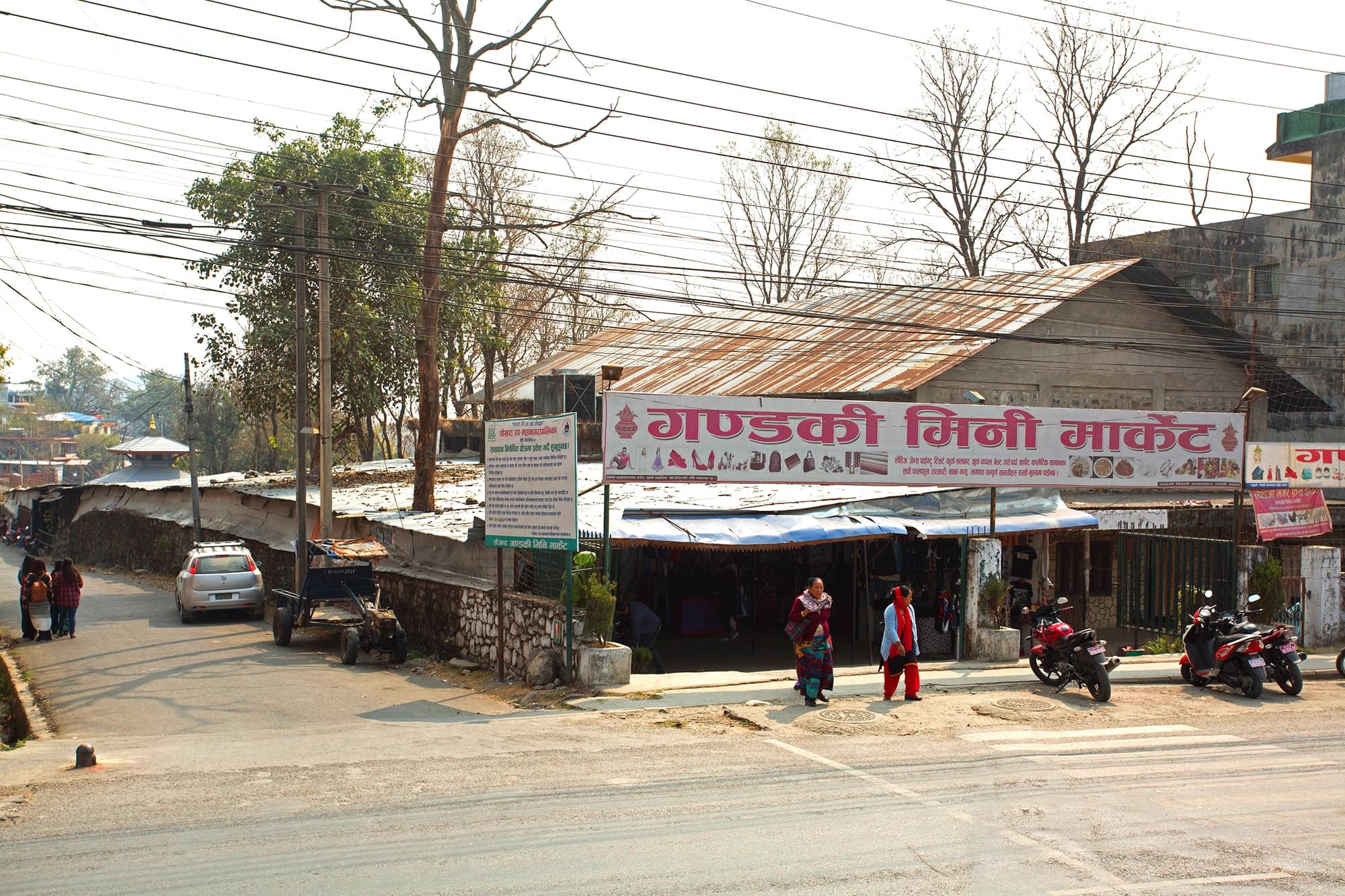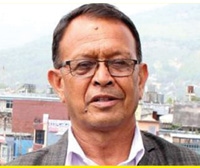Middlemen have laid siege to the government property situated at the main chowks of the tourist city of Pokhara. The powerful local government has been unable to preserve the national property.
-Yuvaraj Shrestha: Centre for Investigative Journalism-Nepal
The 5 ropani 3 anna land claimed by Gandaki Mini Market in Nayabazaar, Pokhara, belongs to the Agricultural Development Bank (ADB) Main Branch Office Pokhara. The bank has been unable to use its property for the last five years as a few locals have grip over this government property.
A group involving Bam Bahadur Karki, Santosh Sonam and Dinesh Dahal, chairman, vice-chairman and secretary respectively of the Mini Market committee, among others, of Pokhara occupied the government land by building the Mini Market. They have been defying the bank’s repeated calls to vacate the land.

Huts built by encroaching upon the land belonging to the Regional Hospital Pokhara (currently the Pokhara Institute of Health Sciences). Pictures: Yunish Gurung
The bank administration has repeatedly ordered clearance of the land saying that it was “seized illegally without any suggestion, advice and contract”. This has not deterred the group. Ramchandra Aryal, officiating manager at the ADB Main Branch Office Pokhara, said, “They have threatened bank staff not to enter the land.”
The ADB office, which has rented a house in Chipledhunga, is trying to shift to Nayabazaar by constructing a building on its land there. When other efforts failed, bank officials put up a notice at the plot–‘Bank Building Construction Site’–but the Mini Market operators threw it away. “They did not heed our repeated verbal and written ultimatums to make way for our construction,” said Aryal. The bank last published a 35-day notice on local newspapers on November 23, 2017 for vacating the land, to no avail.
Mini Market operators have built 100 huts on the land. At the market rate, they collect Rs 700,000 per month by renting them. A shopkeeper who has rented one of them says he pays Rs 7,000 every month for the space. The trader, requesting anonymity for fear of reprisal from the operators, said he had no idea if they paid tax on the rent. While they earn about Rs 10 million annually by renting the huts, the operators pay no tax to government agencies including the bank and the Pokhara Sub-metropolitan City.
For another instance, the Western Regional Community Hospital is in operation near Prithvi Chowk Bus Park in Pokhara. According to government records, the 26 ropani land used by the hospital belongs to Transport Management Office, Gandaki. When the office now seeks to construct a building on the land, hospital operators are unwilling to leave the property.

A fair market being built in Prithvi Chowk, Pokhara.
Information Officer at Transport Management Office, Gandaki Bharat Mani Baral said the hospital administration had defied repeated calls to leave. “We made written and verbal requests to vacate the land. When that did not work, we issued public notice and made public announcement. They haven’t heeded our calls,” said Baral. Besides the hospital building, some commercial buildings and huts have also been constructed on the land. The hospital operators are earning by renting the structures.
The land was first registered in the name of the National Construction Company Limited under the Physical Infrastructure and Transport Management Ministry. It had built physical structure for its use. When the government dissolved the Limited on August 7 2014, the property came under the ownership of the ministry.
A ministerial-level decision on April 4, 2015 transferred ownership of the land to the Transport Management Office, Gandaki. At present, the land title is held by Gandaki Driving Licence Office, which also has the authority to use the building on the land.
The Western Regional Health Cooperative Organisation, which operates the hospital, has refused to vacate the land, claiming that it had rented the property. The National Construction Company Limited had leased the land to the cooperative 15 years ago. The contract expired last year but the cooperative has refused to move out.
The health cooperative that runs the hospital has 29 promoters and is chaired by Hari Prasad Pande. The group has rented the hospital building and shutters there with a profit motive. The cooperative has rented 10 shutters by taking Rs 300,000 each in advance payment. Traders who have rented the shutters pay the cooperative Rs 11,000 to Rs 20,000 each month. The cooperative has made the property a cash cow even after expiry of the contract.
There is another instance in Pokhara of middlemen exploiting national property. More than five ropani land belonging to the Pokhara Academy of Health Sciences (the erstwhile Western Regional Hospital) has been encroached upon for more than three decades. According to a hospital administrator, hospital staff themselves have built huts on the land. Currently, 28 families have been living on the plot.
Five decades ago, locals of Pokhara had donated the land to the government for building hospital. When the hospital was established 12 years later, the donated and acquired land measured 207 ropanis in total.
According to hospital administration, continued encroachment has left only 170 ropanis with the hospital. PAHS Vice-chancellor Dr Buddhi Bahadur Thapa, however, expresses ignorance about the issue. “I’ve no reports of land encroachment,” said Thapa. “I’ll take initiatives to evict the encroacher if any.”
‘Rent seeking’ trend
A few individuals and their groups in Pokhara first try to grab government land. If that is not easy, they make an arrangement for renting property at a cheap rate for leasing it out for a much higher price later. This practice enables appropriation of government land by a few people. Even when such deals take away open spaces from public and deprive the government of taxes, the metropolis and the local administration have shut their eyes to such groups openly misusing state property.

The Pokhara Mini Market in Sirjana Chowk. Contractors had demolished the government building for new construction here.
One example is the five ropani land owned by the Nepal Airlines Corporation in Prithvi Chowk, Pokhara. Krishna Prasad Shrestha had rented the land for 11 years from April 1, 2006. He then built huts on the land and rented them out to others but he did not pay the Civil Aviation Authority of Nepal the agreed sum. Shrestha later rented the land to Bharat Gurung, who further leased it to another person, Shiva Khanal, by keeping his cut.
Shrestha had leased the land from CAAN until April 12, 2016. The initially agreed rent was Rs 30,500 per month, with an agreement to increase it by 25 percent every two years. At this rate, the monthly rent had reached Rs 64,000 in the final year. Beyond the agreement, Shrestha occupied the land for 15 more months, even without paying the rent for the additional months.
Shrestha has other dues to pay. He has not paid Rs 951,000 to the water utility and Rs 74,400 in electricity bill for the last eight years. Both the utilities have failed to recover the dues despite efforts.
Account Officer Surya Nepali at the Pokhara office of Nepal Airlines says, “Shrestha has yet to pay Rs 18.5 million including the rent for 15 months after the contract was over, and electricity and water tariffs. We wrote letters to him, published notices on newspapers but he hasn’t appeared.”
In this situation, the NAC rented the land to Suryadeep Investment Company, Kathmandu for five years on October 18, 2017. According to the corporation records, Rajendra Bahadur Gorkhali alias Raju Gorkhali has signed the contract paper on behalf of the company. Gorkhali has agreed to pay the corporation Rs 1,100,000 every month. But Gorkhali has already rented the land to a person called Yubaraj Khatiwada. Known as a fair-price market in Pokhara, more than 190 shutters are being built at the place. Most have been rented out before their construction is over.

The Gandaki Mini Market built in front of the Naya Bazaar-based regional office of the Commission for Investigation of Abuse of Authority by grabbing the land of the Agricultural Development Bank in Pokhara.
Here is another example of the rent seeking trend. Pokhara-Lekhnath Metropolis has built a shopping complex at Sirjana Chowk. The structure built on a loan from the town development fund has been leased for five years for an annual rent of Rs 7.6 million. The three-storey commercial building having 11 shutters on the ground floor alone has been rented by Surendra Basnet for the “Just In Time” company.
Basnet has rented the shutters to several persons by charging between Rs 22,000 and Rs 80,000 per month. He is planning to rent out space on the first and second floors too. At this rate, Basnet will earn enough from the ground floor shutters alone to pay the metropolis its annual rent. The rest of the income will be his profit.
The metropolis has rented eight shutters based in Mahendrapul and Rastra Bank chowk in Pokhara. Rented by Min Bahadur Gurung for Karapukot Multiservice Company two years ago, the shutters have been rented out to others.
I’ll evict them immediately: Mayor
 Man Bahadur GC, Mayor
Man Bahadur GC, Mayor
The Local Government Operation Act gives the authority and duty of conserving public and government property; historical and archaeological heritage sites; public and community buildings; and public, unregistered and fallow land within the metropolis to the concerned ward executive committee.
But the metropolis has failed to end exploitation of government property. Pokhara-Lekhnath Mayor Man Bahadur GC admitted that brokers had their way with the property in the metropolis. “Enough is enough. I’ve started the process to defang the middlemen. No one will be spared,” said GC.
GC said he had formed a team to free all public and government property in Pokhara with an aim to end the middlemen’s influence by formulating a new working procedure. The metropolis has set aside Rs 4 million to prepare an inventory of public and government property within its territory. Senior Legal Officer Narayan Prasad Sharma said tasks including identification of public property and their survey were taking place.
Ex-officiating AG Khatri holds the local government accountable for preventing middlemen from reaping profit from the use of public property. “The duty is now of the metropolis to check middlemen who earn by flouting the Public Procurement Act and the Financial Transaction Act,” said Khatri. “Misappropriation of public property had been rife in the absence of people’s representatives. Elected officials must control this.”
According to records at the metropolis, Gurung had rented five shutters at Mahendrapul for Rs 117,800 in total and three shutters at Rastra Bank chowk for a total of Rs 50,800 per month. Now he has rented them all out to other people by charging them Rs 200,000 to Rs 300,000 apart from the rent per person.
Gurung had made a verbal agreement with the shopkeepers that they would pay monthly rent to the metropolis. “While starting the shop, I paid two/three lakhs to Min Bahadur. Now I pay the monthly rent to the metropolis,” a shopkeeper who rented the space from Gurung said.
Gurung, who rented out shutters that he first rented from the metropolis keeping a profit, is a defeated Maoist chairman candidate for Pokhara Lekhnath Metropolitan City Ward No 12.
The metropolis has rented its 32 shutters in the Mahendrapul area in this manner. In a tender issued two years ago, new traders had rented space by competitive bidding. Excepting a few, a majority of those who entered into the agreement rented the shutters to others.
Senior legal officer at Pokhara-Lekhnath Narayan Sharma said, “In the rent agreement, the metropolis is the first party while the selected bidder, individual or company, is the second party. We don’t recognize others.”
Thirteen huts and some open land owned by the Pokhara Regional Hospital (presently the Pokhara Academy of Health Sciences) have been rented out. According to hospital records, the annual rent for the whole property is Rs 4,429,188. While a single person has leased the space, several people are running their businesses from the shutters.
Two ropani 12 ana land where the Mini Market is being operated near Srijana Chowk is registered in the name of the District Coordination Committee (the erstwhile District Development Committee). Until the 2015 earthquake, there was a Panchayat-era building. After the earthquake, the Mini Market operators demolished the building in collusion with the DDC. They pulled down the building that had stayed intact, terming it “damaged” and “ruined” to build commercial structures. The Mini Market is run from 50 shutters, which have been rented out by Keshar Gurung for costly rates after he made a cheaper deal with the DDC.
Former officiating attorney general Sukadev Khatri calls this kind of practice ‘outright corruption’. “The act of leasing government land or building but earning profit by renting it out to others later is contrary to the Public Procurement Act and Financial Procedure Act,” said Khatri.
Political cover
The Pokhara group that stays in business by domineering the Agricultural Development Bank staff has the backing of local political leaders. Gandaki Mini Market Chairman Bam Bahadur Karki said openly: “Political parties, administration, sub-metropolis and the chamber of commerce and industry have let us stay here.”
But Kaski Chief District Officer Tara Nath Adhikari said there had been no written agreement on permitting private business on the government land, which was “impossible”. “Nobody can be permitted to stay or do business on government land without agreement,” CDO Adhikari said. “Administration, municipality or any agency has no authority to permit this.”
Instead of helping bring the people who collect rent for unauthorized building on the bank’s land in Prithvi Chowk to justice, political parties are abetting them. A glaring example of this is a felicitation programme organized two months ago when the illegally earning group feted Maoist Centre lawmakers Ramji Baral and Dipak Koirala.
After Gandaki Mini Market Chairman Bam Bahadur Karki, Vice-chairman Santosh Sonam and others honoured them with vermillion and garland, the MPs had said, “We’re with you.” Baral and Koirala are Provincial Assembly members elected from the Kaski 3 B and Kaski 1 A constituencies, respectively. This solidarity between the traders and the politicians shows that the seizing of government land has political backing. Lawmaker Baral had then said: “I’ll stand by Gandaki Mini Market operators in their times of trouble.”
The administration had to use force to evict old traders from the Prithvi Chowk-based huts after expiry of the contract. While the Maoist Centre supported old entrepreneurs, the Netra Bikram Chand-led Maoist outfit backed new contractors. When old contractors did not leave after the contract came to an end, the administration padlocked the main gate of the fair price market on July 6, 2017. After this, the Chand group organised protest rallies and assemblies almost every day and submitted memos to the local administration against the move. The group had demanded revoking new contract signed following a due tender process. When the administration used force increasingly, the protests fizzled out.
Maoists rule the roost also at the land and building owned by the Gandaki Driving Licence Office. A Maoist-aligned trade union has set up its office at the building. Maoist cadres also live there without paying any fees and without permission from the office. According to Information Officer Bharat Mani Baral, the cadres’ casual reply is “we’ll move out whenever the office needs the space”.



